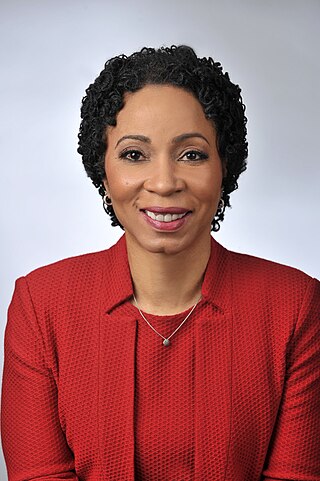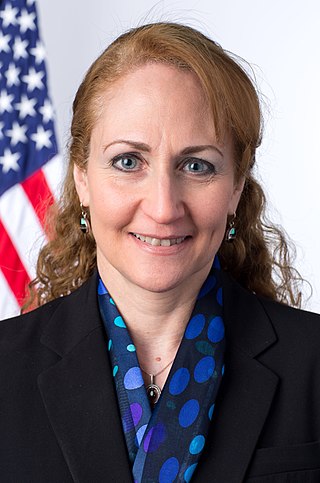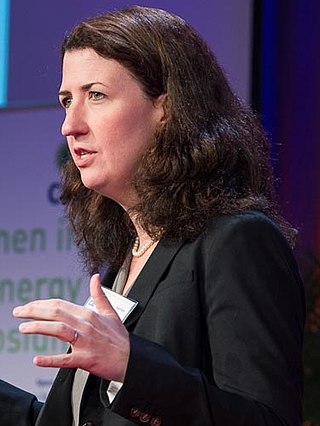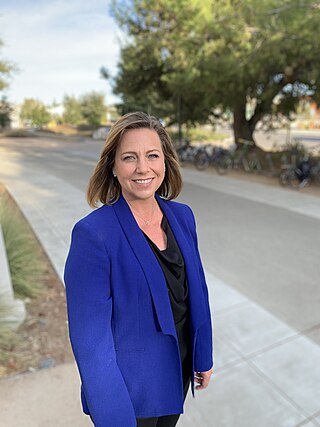Related Research Articles

The Wisconsin School of Business (WSB) is the business school of the University of Wisconsin–Madison, a public research university in Madison, Wisconsin and consistently ranks among the top business schools in the world. Founded in 1900, it has more than 45,000 living alumni. The undergraduate program prepares students for business careers, while its Master of Business Administration (MBA) program is based on focused career specializations, and its PhD program prepares students for careers in academia. The school offers student services, such as Accenture Leadership Center, The Huber Business Analytics Lab and International Programs. In the 2019 U.S. News & World Report rankings, the Wisconsin School of Business's undergraduate program was ranked 18th overall among business schools. The University of Wisconsin-Madison currently has the most Fortune 500 CEOs alumni of any school in the world, with 14.
Betty Diamond is an American physician and researcher. She is director of the Institute of Molecular Medicine at Northwell Health's Feinstein Institute for Medical Research in Manhasset, NY. She was elected a member of the National Academy of Sciences in 2022.

Helene D. Gayle is an American physician who has served as the president of Spelman College since 2023. She formerly served as CEO of the Chicago Community Trust, one of the nation's leading community foundations.

The University of Wisconsin Carbone Cancer Center (UWCCC) is a comprehensive cancer center in Wisconsin, as designated by the National Cancer Institute (NCI), the lead federal agency for cancer research. It is an integral part of both the University of Wisconsin (UW) and the University of Wisconsin Hospital and Clinics. It is located in Madison, Wisconsin.

Jo Emily Handelsman is the Director of the Wisconsin Institute for Discovery at University of Wisconsin–Madison. She is also a Vilas Research Professor and a Howard Hughes Medical Institute Professor. Dr. Handelsman was appointed by President Barack Obama as the Associate Director for Science at the White House Office of Science and Technology Policy, where she served for three years until January 2017. She has been editor-in-chief of the academic journal DNA and Cell Biology and author of books on scientific education, most notably Scientific Teaching.

Linda P. Fried is an American geriatrician and epidemiologist, who is also the first female Dean of Columbia University's Mailman School of Public Health. Her research career is focused on frailty, healthy aging, and how society can successfully transition to benefit from an aging population.
Rozalyn (Roz) Anderson is a professor at the University of Wisconsin School of Medicine and Public Health. She studies aging and caloric restriction in primates.

Marie A. Bernard, M.D. is the Chief Officer for Scientific Workforce Diversity at the National Institutes of Health (NIH). Prior to this, she was the deputy director of the National Institute on Aging at the NIH, where she oversaw approximately $3.1 billion in research focused on aging and Alzheimer's disease. Bernard co-leads the NIH UNITE initiative, launched in 2021 to end structural racism in biomedicine. She co-chairs the Inclusion Governance Committee, which promotes inclusion in clinical research by sex/gender, race/ethnicity, and age. She also co-chairs two of the Department of Health and Human Services Healthy People 2020 objectives: 1) Older Adults, and 2) Dementias, including Alzheimer's disease. Prior to arriving at NIH in 2008, Bernard served as Donald W. Reynolds Chair in Geriatric Medicine and founding chairperson of the Donald W. Reynolds Department of Geriatric Medicine at the University of Oklahoma College of Medicine, and Associate Chief of Staff for Geriatrics and Extended Care at the Oklahoma City Veterans Affairs Medical Center.
Anne B. Newman M.D., M.P.H, is a scientist who researches Epidemiology and Gerontology. She received her Bachelor's, Master's and M.D. degrees from the University of Pittsburgh. Dr. Newman's primary focus of study is on atherosclerosis, longevity and what specific factors allow for people to thrive while aging. She is well-versed in the subjects of cardiovascular disease, sarcopenia, and the body's physical and mental functions. Born in Pennsylvania, the American research scientist focuses on Geriatrics, Gerontology and Epidemiology. She was the first scholar to be awarded the Katherine M. Detre Endowed Chair of Population Health Science at the University of Pittsburgh. She is widely published and has been listed on the annual ISI Web of Knowledge most highly cited scientists for 2015, as published by Thomson Reuters. Newman is a member of the Delta Omega Honor Society in Public Health and the American Epidemiology Society. Dr. Newman's highest qualifications are in geriatric medicine and her certification is through the American Board of Internal Medicine. Newman lives in Point Breeze Pennsylvania with her husband, Frank Kirkwood. She is a mother of three to Dan, Joe, and Bridget.
Carolyn M. Mazure is an American psychologist and the Norma Weinberg Spungen and Joan Lebson Bildner Professor of Psychiatry and Psychology at the Yale School of Medicine. She created and directs Women’s Health Research at Yale — Yale’s interdisciplinary research center on health and gender.
Susan Zaeske is Professor of Rhetoric and Public Culture in the Department of Communication Arts and Arts and Associate Dean for Arts and Humanities in the College of Letters & Science at the University of Wisconsin-Madison.
Joan Y. Reede is an American physician. She is Harvard Medical School's inaugural dean for diversity and community partnership, and a member of the National Academy of Medicine. She is known for creating programs that mentor and support minority physicians and female physicians. Alumni of her programs have created a 501(c)(3) organization called The Reede Scholars in her honor.

Tracey Holloway is the Jeff Rudd and Jeanne Bissell Professor of Energy Analysis and Policy at the Nelson Institute for Environmental Studies at the University of Wisconsin-Madison and Department of Atmospheric and Ocean Sciences. Her research focuses on the links between regional air quality, energy, and climate through the use of computer models and date from satellites.

Gender discrimination in health professions refers to the entire culture of bias against female clinicians, expressed verbally through derogatory and aggressive comments, lower pay and other forms of discriminatory actions from predominantly male peers. These women face difficulties in their work environment as a result of a largely male dominated positions of power within the medical field as well as initial biases presented in the hiring process, but not limited to promotions.

Jonna Ann Keener Mazet is an American epidemiologist and Executive Director of the University of California, Davis One Health Institute. Recognized for her innovative and holistic approach to emerging environmental and global health threats, she is an elected member of the National Academy of Medicine and a fellow of the American Association for the Advancement of Science. Mazet is a professor of Epidemiology and Disease Ecology at the UC Davis School of Veterinary Medicine, where she focuses on global health problem solving, especially for emerging infectious disease and conservation challenges.

Angela Michelle Byars-Winston is a professor of Internal Medicine at the University of Wisconsin–Madison. She was the first African American to achieve the rank of tenured Full Professor of medicine at the University of Wisconsin–Madison. She studies the impact of culture on career development, in particular for women and minorities in STEM. She is a Fellow of the American Psychological Association and was one of Barack Obama's Champions of Change.
Laura Albert is a professor of Industrial and Systems Engineering at the University of Wisconsin-Madison in the College of Engineering. Albert is an expert in Operations Research, specializing solving and modeling discrete optimization problems arising from applications in homeland security, disaster management, emergency response, public services, and healthcare.
Cara Tannenbaum is a Canadian researcher and practicing physician in the fields of geriatrics, women's health and gender research. Since 2015, Tannenbaum has served as the Scientific Director of Canadian Institutes of Health Research's Institute of Gender and Health. She was appointed as a Member of the Order of Canada on November 17, 2021.

Julia Adler-Milstein is a Professor of Medicine and Director of the Center for Clinical Informatics and Improvement Research at the University of California, San Francisco. In 2019, she was named a Member of the National Academy of Medicine.

Fatima Cody Stanford is an American obesity medicine physician, internist, and pediatrician and an associate professor of medicine and pediatrics at Harvard Medical School. She is one of the most highly cited scientists in the field of obesity.
References
- 1 2 3 4 Pfahler, Sandy; Coleman, Joyce; Carnes, Mary (Molly) (2006). "Oral History Interview: Mary (Molly) Carnes (675)".
{{cite journal}}: Cite journal requires|journal=(help) - ↑ Lee, Richard (2014-01-01). "The Campus School at SUNY Buffalo State, 1871-1991". A Selection of Works on the History of Buffalo State.
- 1 2 3 4 "Molly Carnes breaks through biases". UW School of Medicine and Public Health. Retrieved 2023-04-09.
- ↑ "Article Host page - fall 2014". www.buffalo.edu. Retrieved 2023-04-09.
- ↑ "Molly Carnes". www.wisconsinacademy.org. 2012-09-12. Retrieved 2023-04-09.
- ↑ "Previous Award Winners: Women in Medicine and Science Leadership Development Award". AAMC. Retrieved 2023-04-09.
- ↑ "Center for Women's Health Research - The Wisconsin Idea Database". wisconsinidea.wisc.edu. Retrieved 2023-04-09.
- ↑ "Learn About NSF ADVANCE | Women In Science & Engineering Leadership Institute (WISELI)". wiseliarchive.engr.wisc.edu. Retrieved 2023-04-09.
- ↑ "People of WISELI | Women In Science & Engineering Leadership Institute (WISELI)". wiseliarchive.engr.wisc.edu. Retrieved 2023-04-09.
- ↑ "New Directions for WISELI". WISELI. 2023-03-08. Retrieved 2023-04-09.
- ↑ Sheridan, Jennifer T.; Fine, Eve; Pribbenow, Christine Maidl; Handelsman, Jo; Carnes, Molly (June 2010). "Searching for excellence & diversity: increasing the hiring of women faculty at one academic medical center". Academic Medicine: Journal of the Association of American Medical Colleges. 85 (6): 999–1007. doi:10.1097/ACM.0b013e3181dbf75a. ISSN 1938-808X. PMC 4128022 . PMID 20505400.
- ↑ "Carnes, Molly". WISELI. 2018-10-22. Retrieved 2023-04-09.
- 1 2 "NIH recognizes WISELI for its work to improve gender diversity in academia | Research | UW–Madison" . Retrieved 2023-04-09.
- ↑ "Molly Carnes, M.D., receives inaugural Linda Joy Pollin Heart Health Leadership Award". EurekAlert!. Retrieved 2023-04-09.
- ↑ "News | WCER". wcer.wisc.edu. Retrieved 2023-04-09.
- ↑ Gutierrez, Belinda; Kaatz, Anna; Chu, Sarah; Ramirez, Dennis; Samson-Samuel, Clem; Carnes, Molly (December 2014). ""Fair Play": A Videogame Designed to Address Implicit Race Bias Through Active Perspective Taking". Games for Health Journal. 3 (6): 371–378. doi:10.1089/g4h.2013.0071. ISSN 2161-7856. PMC 4559151 . PMID 26192644.
- ↑ "Molly Carnes receives WARF Named Professorship". WISELI. 2019-05-06. Retrieved 2023-04-09.